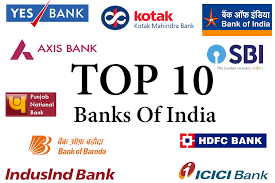To what extent does a nation's financial industry matter? It is unquestionably the foundation of an economy because it supports commerce, investments, and economic progress in addition to ensuring universal financial access and lending to both individuals and companies. Throughout the past ten years, India's banking industry has seen tremendous change due to the country's growing economy and tech-savvy populace. In 2024, the largest banks in India rank among the top banks worldwide in terms of market capitalization. For instance, based on market capitalization, HDFC Bank is ranked in the top 10 banks worldwide in 2024.
This article will examine the top 10 banks in India and provide a thorough analysis of their business practices, financial results, and overall influence.
Top Indian banks in 2024 based on market cap
Here's a table showcasing the top 10 banks in India, ranked by their market caps (as of February 13, 2024).
Rank & Bank Name | Type | Market Cap (Rs Lakh Crore) |
#1 HDFC Bank | Private | 10.57 |
#2 ICICI Bank | Private | 7.14 |
#3 SBI | Public | 6.63 |
#4 Kotak Mahindra | Private | 3.44 |
#5 Axis Bank | Private | 3.30 |
#6 Punjab National Bank | Public | 1.34 |
#7 Bank of Baroda | Public | 1.33 |
#8 Indian Overseas Bank | Public | 1.22 |
#9 IndusInd Bank | Private | 1.13 |
#10 Union Bank | Public | 1.00
|
HDFC Bank
- Founded on: August 30, 1994
- CEO: Sashidhar Jagdishan
Based on market capitalization, HDFC Bank ranks fourth globally and is the biggest bank in India. It is a well-known entity in the financial sector and is one of the top private banks in India. HDFC Bank is a major participant in retail, corporate, and institutional banking and is renowned for its strong performance and creative solutions.
HDFC Bank and HDFC Ltd., a sibling home finance corporation, amalgamated on July 1, 2023. The purpose of the merger was to offer consumers better, more complete financial services.
The managing director and CEO of HDFC Bank, Sashidhar Jagdishan, was recently recognized as the highest-paid bank CEO in India.
ICICI Bank
- Founded on: January 5, 1994
- CEO: Sandeep Bakhshi
Financial services provided by ICICI Bank are extensive. It is well-known for its customer-friendly approach, affordable prices, and cutting-edge technology, and it serves millions of clients in India and overseas.
Notably, ICICI Bank stated in its most recent ESG Report that its green finance portfolio accounted for 21.4% of the total amount they gave out in 2023, or over $119 billion.
State Bank of India (SBI)
- Founded on: July 1, 1955
- Chairman: Dinesh Kumar Khara
SBI is the biggest public sector bank in India, with its main office located in Mumbai. With over 233 foreign branches spread across 36 countries, it has a significant international presence in addition to its 22,405 branches in India, where it enjoys a 23 percent market share.
SBI became the most profitable firm in India in the April–June quarter of the fiscal year 2023–24, surpassing Reliance Industries.
Kotak Mahindra Bank
- Founded on: November 21, 1985
- CEO: Dipak Gupta (interim)
Corporates, merchants, and SMEs are just a few of the clients that Kotak Mahindra Bank serves with its diverse range of services.
After 21 years as the managing director and chief executive officer of Kotak Mahindra Bank Ltd., Uday Kotak has resigned. It is unknown who would succeed him, although the RBI is said to have mobilized in favor of an outsider.
Axis Bank
- Founded on: December 3, 1993
- CEO: Amitabh Chaudhry
One of the biggest banks in the private sector in India is Axis Bank. It specializes in financial services for retail, small and medium-sized enterprises, and corporations. Prioritizing digital banking, Axis Bank meets a wide range of retail, corporate, and institutional demands while guaranteeing a smooth and user-friendly experience.
The CEO of Axis Bank, Amitabh Chaudhry, earns the second-highest salary among Indian bank CEOs. This year, the bank collaborated with the online banking company OPEN to offer its user base a native digital current account journey.
Punjab National Bank of India (PNB)
- Founded on: May 19, 1893
- CEO: Atul Kumar Goel
Retail, corporate, and international banking are just a few of the many banking services offered by Punjab National Bank. The bank's significant presence in rural and semi-urban areas demonstrates its dedication to financial inclusion. It has more than 180 million customers.
As one of the bank's original founders, freedom fighter Lala Lajpat Rai was intimately involved in the early management of the institution.
Bank of Baroda (BoB)
- Founded on: July 20, 1908
- CEO: Debadatta Chand
Bank of Baroda, which has its headquarters in Vadodara, Gujarat, merged with Dena Bank and Vijaya Bank in the first-ever three-way merger. Having been nationalised, Bank of Baroda is well-known for its wide branch network, wide range of banking services, including corporate and retail banking as well as treasury activities.
As to the latest documents, the Bank of Baroda's net profit for the April to June quarter of FY 2023–24 was ₹4,070.1 crore, which represents an 88.7% increase over its performance during the corresponding period in the previous fiscal year.
Indian Overseas Bank
- Founded on: 10 February 1937,
- CEO:Ajay Kumar Srivastava
When the Indian Overseas Bank was first established in 1937, its primary activity was foreign exchange. These days, it provides financial services like investments, loans, and savings accounts. Indian Overseas Bank is well-represented in the nations and maintains branches in Singapore, Hong Kong, Thailand, South Korea, and Sri Lanka.
IndusInd Bank
- Founded on: April 17, 1994
- CEO: Sumant Kathpalia
One of India's leading private banks is IndusInd Bank. The bank provides a range of financial services and has branches mostly in major Indian metropolises, as well as representative offices in Dubai, Abu Dhabi, and London. For retail, corporate, and institutional clients, it places a premium on individualized solutions and top-notch customer support.
Recently, Shiv Kumar Bhasin, the former Group Chief Technology and Operations Officer and Executive Vice President of the NSE, joined IndusInd Bank in the role of Chief Transformation Officer.
Union Bank of India (UBI)
- Founded on: November 11, 1919
- CEO: A. Manimekhalai
In 1919, the Union Bank of India was founded, and Mahatma Gandhi opened its doors. Along with 14 other banks, the bank was nationalized in 1969 so that its assets might be used for the advancement of the nation. Four branches of UBI existed when India gained independence. Thanks to the merger with Corporation Bank and Andhra Bank in April 2020, it now has a network of more than 8700 branches throughout India.
IDBI Bank
- Founded on: July 1, 1964
- CEO: Rakesh Sharma
The Indian government founded IDBI (Industrial Development Bank of India) in 1964 with the goal of serving the industrial sector as a development financial institution. The organization and the commercial branch combined in 2005 to form the current IDBI Bank. IDBI is the parent organization of SIDBI, EXIM, SEBI, National Stock Exchange of India, and National Securities Depository Limited. The bank is currently 45.48 percent owned by the Indian government, with Life Insurance Corporation (LIC) holding the remaining 49.24 percent after the institute was requested to provide capital and oversee the bank to comply with regulatory standards in 2019.
FAQs
1. Which bank has the highest market cap in the world?
US’s JP Morgan Chase has the highest market cap among all banks in the world at $432.31 billion.
2. Which is India’s first private bank?
IndusInd Bank, established in April 1994 in Mumbai, holds the title of India's first private bank.









